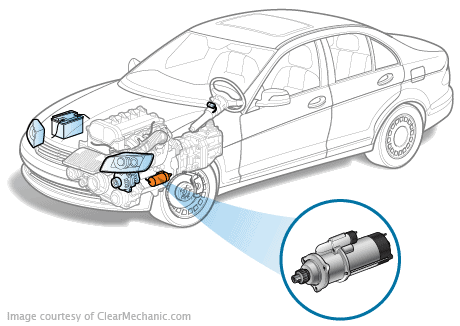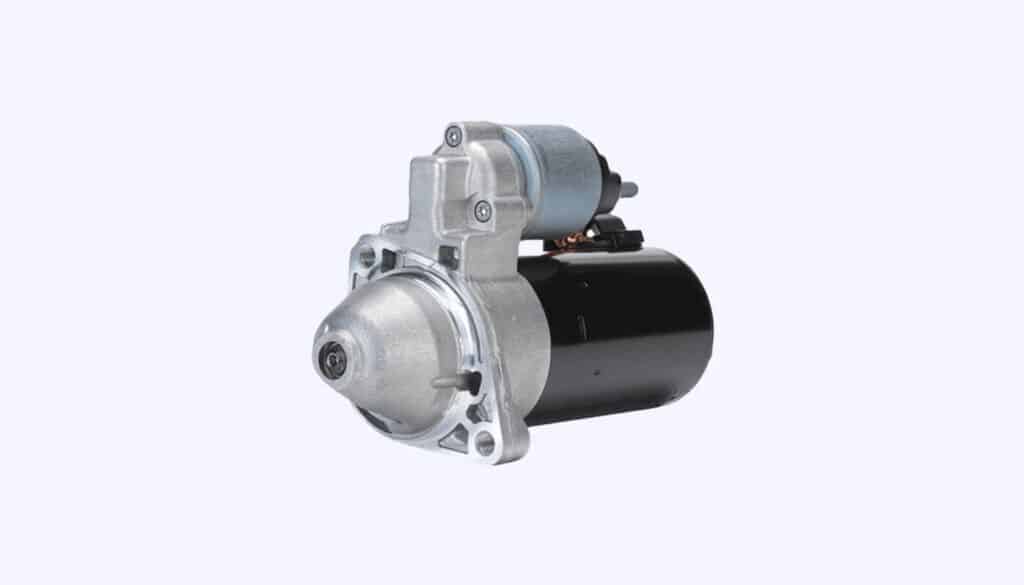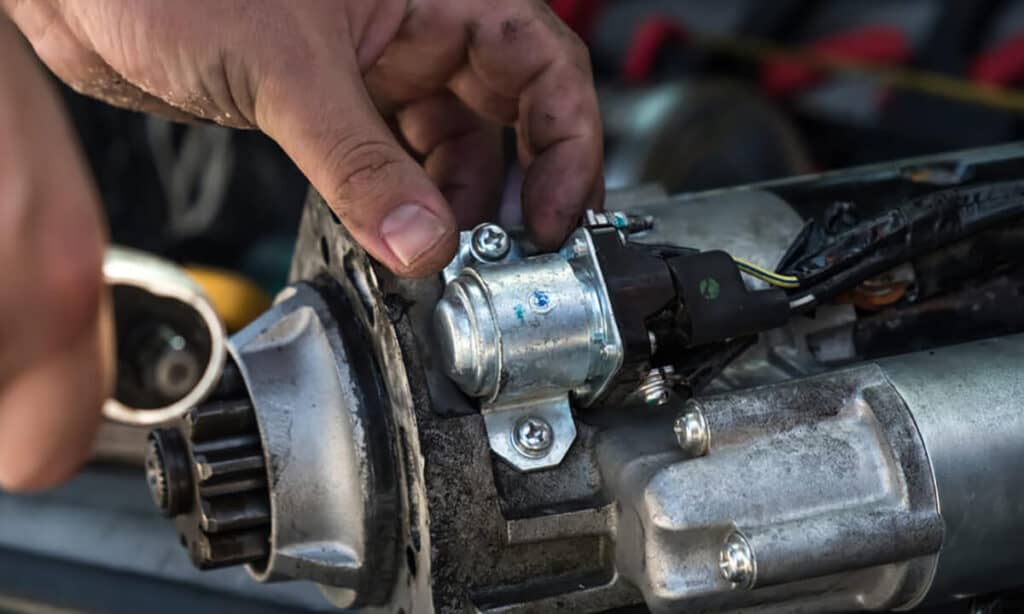Introduction: Keep Your Engine Cranking with a Reliable Starter
Is your car struggling to start, or not starting at all? You might be dealing with a faulty starter. In this guide, we’ll cover the importance of a starter, the cost of replacing one in Canada, and tips for prolonging its lifespan. Let’s get started!
What is a Starter?
A starter is an electric motor that cranks the engine to start it. It works by engaging the flywheel, which turns the crankshaft and initiates the combustion process.
How Much Will it Cost to Replace a Starter in Canada?
• Parts: $150 – $350
• Labor: $100 – $200 (1 to 2 hours)
• Total: $250 – $550
The cost of replacing a starter in Canada varies depending on the make and model of your vehicle. On average, you can expect to pay between $250 and $550 for parts and labor.

What are the Symptoms of a Faulty Starter?
The symptoms of a faulty starter can vary, but common signs include:
• No response when turning the key: If the starter is faulty, you may not hear any noise or experience any response when you turn the ignition key.
• Clicking noise: When you attempt to start the engine, you might hear a clicking noise, indicating that the starter solenoid is trying to engage but cannot due to a malfunctioning starter motor.
• Intermittent starting issues: Sometimes the engine may start without any issue, while at other times, it might fail to crank, suggesting a failing starter.
• Slow cranking: The engine might turn over slowly or with difficulty due to a weak starter motor, struggling to provide enough power to crank the engine.
• Freewheeling: If you hear a high-pitched whining sound when trying to start the engine, it may indicate that the starter is not engaging the flywheel properly, causing it to spin freely without turning the engine.
• Smoke or burning smell: A short circuit, overheating, or damaged wiring within the starter can cause smoke or a burning smell.
• Starter remains engaged: In some cases, the starter may continue to run even after the engine has started, which can cause damage to both the starter and the flywheel.
• Battery issues: A faulty starter can drain the battery, causing it to become weak or discharged, leading to other symptoms like dimming lights or slow cranking.
How Long Does a Starter Last?
A starter typically lasts between 160,000 and 240,000 kilometers, but its lifespan can be affected by factors such as driving habits, climate, and overall maintenance of the electrical system.
How Does a Starter Become Defective?
A starter can become defective due to various reasons, including:
• Normal wear and tear: Over time, the internal components of the starter, such as the brushes, armature, and solenoid contacts, can wear out, reducing the starter’s efficiency and eventually leading to failure.
• Poor electrical connections: Corrosion or loose connections in the wiring and terminals connecting the starter to the battery and other components can cause the starter to malfunction.

• Excessive heat: Exposure to high temperatures can cause damage to the starter motor windings and solenoid, leading to reduced performance and eventual failure.
• Manufacturing defects: In some cases, the starter may have been manufactured with substandard materials or workmanship, leading to premature failure.
• Contamination: Dirt, oil, or moisture entering the starter can cause damage to the internal components, leading to reduced efficiency and eventual failure.
• Improper installation: If the starter is not installed correctly, it may not function as intended and may become damaged.
• Faulty components: Other components in the starting system, such as the battery, ignition switch, or relay, can cause the starter to work harder than necessary or operate inappropriately, leading to premature wear and failure.
How Can a Faulty Starter Affect Other Systems in the Car?
• Increased strain on the battery: Repeated attempts to start the engine with a faulty starter can drain the battery, potentially causing it to fail.
• Damage to the flywheel: A malfunctioning starter can cause the gears to grind against the flywheel, leading to damage and costly repairs.
• Wear on the ignition switch: Continually trying to start the vehicle with a faulty starter can cause excessive wear on the ignition switch.
• Damage to the starter solenoid: A failing starter can also cause the starter solenoid to wear out or fail, requiring replacement.
• Potential electrical issues: A faulty starter may cause electrical problems in the car, potentially affecting other systems and components.
Is it Safe to Drive with a Faulty Starter?
Driving with a faulty starter can be risky and inconvenient, as it is responsible for initiating the engine’s operation. A malfunctioning starter can lead to unreliable engine performance, causing your vehicle to stall or be unable to start when needed. This can put you in a dangerous situation, particularly if you’re stranded in an unfamiliar or unsafe area, or if the car stalls in the middle of a busy road. Additionally, continued attempts to start the engine with a faulty starter can cause damage to other components, such as the flywheel, solenoid, or battery, leading to more expensive repairs.
While it may be possible to drive with a faulty starter for a short period, it is not advisable, as it can lead to progressively worsening issues with your vehicle. If you notice symptoms such as intermittent starting, grinding noises during startup, or a clicking sound when turning the key, it’s essential to have the starter inspected and replaced by a professional mechanic as soon as possible. By addressing the problem promptly, you can prevent further damage to your vehicle and ensure a safer and more reliable driving experience.

How Can I Make My Starter Last Longer?
• Follow your vehicle’s recommended maintenance schedule
• Keep your battery in good condition and replace it when necessary
• Avoid repeated short trips that can cause premature wear on the starter
• Ensure your vehicle’s electrical connections are clean and secure
Can a Mobile Mechanic Replace a Starter?
Yes, a mobile mechanic can replace a starter, provided they have the necessary tools and expertise. This convenient service allows you to have your starter replaced without having to visit a repair shop.
Conclusion: Starter Replacement
Regular maintenance and timely replacement of your starter are essential for ensuring your engine starts reliably. By following the tips provided in this guide, you can prolong the life of your starter and keep your engine cranking with confidence.
Next Steps
Book Your Starter Replacement Service
The service most frequently booked by those who read this article is Starter Replacement. Uchanics’ expert technicians make the process even more convenient by bringing the service right to your doorstep. We perform this job at your home or office, covering over 40 cities in Ontario, including Toronto, Mississauga, Brampton, Oshawa, Ajax, Scarborough, and more. Our commitment to excellence has earned us more than 700 glowing 5-star reviews. Choose Uchanics for your Starter Replacement and experience unparalleled convenience and top-quality service.
